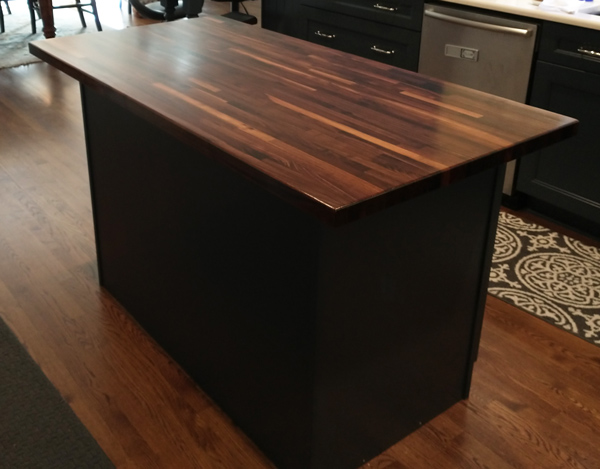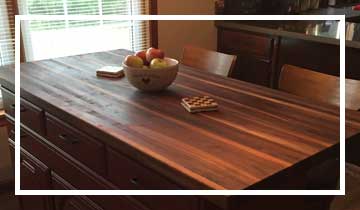Walnut Butcher Block FAQs
Is walnut good for butcher block countertops?
Coming in at 1010 on the Janka scale, walnut wood is halfway between soft and hard, making it an excellent wood to use for butcher block surfaces. Not only is it a durable wood, but it is a favorite among homeowners, since walnut wood adds a gorgeous depth of color and an attractive grain pattern that complements many styles of kitchens and dining rooms. This wood also ages beautifully with time. The only potential drawback to a walnut countertop would be the price, since it costs a bit more than the other woods we have available on this site.
In summary, walnut wood is absolutely one of the best butcher block wood types available! Here is more information about what to know about walnut wood and if it's a good fit for your home.
What is the best wood for a butcher block countertop?
There are quite a few high quality wood types you can choose for your countertops. The most popular would be hard maple and red oak, which are good for their durability, resistance to wear and tear, and lighter coloration. However, other popular choices you'll find are walnut, birch, white oak, ash, beech, and hickory.
At Forever Joint Tops, we craft our butcher blocks using walnut, red oak, hard maple, and hickory woods. These four are some of the most durable types you'll find on the market. Ultimately, your choice of butcher block will depend on your personal preference, as long as you order from a responsibly managed source.
Here is some more information on why you should choose walnut wood for your countertop.
What are the disadvantages of walnut wood?
First, cost. Walnut wood is pricier than red oak and hard maple butcher block countertops.
Second, because of its wide range of color (walnut can vary from lighter brown to deep chocolate brown), you may sometimes find it tricky to match the color of your butcher block countertops to the rest of your kitchen cabinets or dining room. Walnut wood also tends to be a bit more porous than other types of wood.
How do you seal a walnut butcher block?
To start, make sure that the surface of the walnut butcher block countertop is clean. Next, sand the surface using a fine-grit sandpaper. Then you are ready to apply the sealer.
At Forever Joint Tops, we recommend using Waterlox® for your butcher block sealer. Waterlox® is a high-grade tung-oil and resin blend with a water-resistant finish that's food-safe. Follow our steps for how to apply butcher block sealer on our finishing and care page.
If you have further questions, please contact our team here, or get a quote on your butcher block today!


